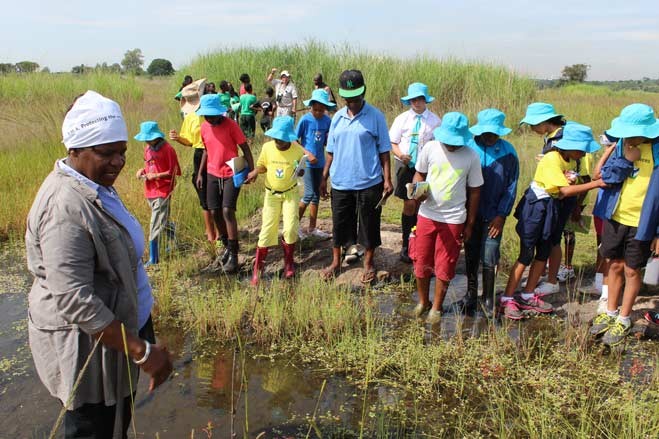-
Wetland worries in Zimbabwe (Weekly blog, 17 June 2018)
Posted on June 17, 2018A blog by Catherine Leonard, Secretary-General
This week has in many ways been more of the same as last week… one thing that particularly stood out however was an enquiry we had about an endangered wetland in Zimbabwe.
Save Monavale wetland!
A group of passionate activists trying to save a major and very important wetland in Harare approached the National Trust of Zimbabwe for advice. ‘Monavale’ is a circa 500 hectare site that is under pressing threat from building development. About 35 hectares is privately owned and the remainder is in local government or city council hands.
There is strong legislation in Zimbabwe that should protect such land. But poor local governance, corruption and a lack of property controls or monitoring is allowing people to build on important wetland areas around Harare.
One idea under consideration was buying up these parcels of land. And the group wanted to know what the Zimbabwe National Trust could do to help.

Students from Harare schools protesting against intended developments on the Monavale wetland
Deploying National Trust models
David Scott therefore got in touch with us to ask for INTO members’ advice on the subject. Protection through ownership – along with acquisition by public subscription – being key tools in the National Trust toolbox!
The Zimbabwe team were particularly interested in other African precedents and also whether this was a common problem? (Thus worthy of discussion at the INTO Africa Group meeting later in the year.) What examples of purchasing privately owned ecologically sensitive land existed? And how had funding been raised – what sort of grants or loans exist? Could the National Trust of Zimbabwe and/or INTO get involved?
The INTO membership immediately – and heartwarmingly – quickly weighed in with suggestions and recommendations. I mysefl saw five responses from Australia, Austria, Isle of Mann, St Helena and Taiwan.
The Australian National Trusts offered numerous examples from saving small Rock Art sites to large forest areas. St Helena National Trust shared an application they had made to a US Foundation specialised in this kind of financing. Furthermore they invited David to plagarise it (stealing with pride!) and offered to make introductions if appropriate. Oliver Maurice reminded us all of the Pink Dolphin Campaign in Taiwan where INTO worked with the Taiwan Environmental Information Association in opposing the proposed construction of a petro-chemical factory on 4500 ha of coastal wetland on the west coast at Dachen.

INTO advisor Oliver Maurice joining colleagues in Taiwan to protest against the proposed petrochemical in the Dachen Wetlands
Strategic wetland acquisition
Our Austrian colleagues at Bodenfreiheit work entirely by buying strategic plots of land. They do this to preserve free space and enforce better spacial planning. So exactly in the right ballpark. Their advice was to identify the most strategically interesting plots and go all out to buy these. They typically look at access roads, long and narrow plots of land and central plots of land. Through crowd-funding and sharing the burden on as many shoulders as possible.
In this case, it would be a case of buying a few interesting plots from the total 500 hectares and by doing so help prevent the implementation of larger developments.
Furthermore Edmund Southworth at Manx National Heritage suggested connecting with local RAMSAR authorities. And making the most of the campaigning and technical resources they make available. He also suggested some sources of grant funding.
Everyone seemed to agree that buying land was the best option, potentially selling on with appropriate conservation agreements.
Way forward
Lastly, many other National Trusts run or have run similar programmes that actively fundraise for new land acquisitions. For example, Buy Back Bermuda or the Neptune Coastline Campaign.
So amongst the INTO membership there is a wealth of knowledge around land acquisition – from how to engage supporters (messaging, tax benefits, etc) to innovative financing models. And interestingly this was the theme of our meeting the previous week with the group from Kiritappu Wetland. They have privately purchased land there and are now developing sustainable activities for wetlands and people. Another great role model!
We agree with David that this could be a topic for discussion at the INTO Africa Conference in October, and/or the ICNT in Bermuda. In the meantime, we hope to be able to support the National Trust of Zimbabwe in all it’s endeavours.
Thanks for reading!

 44 (0)20 7824 7157
44 (0)20 7824 7157